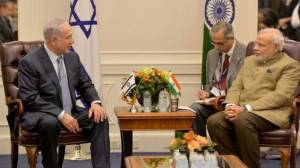A big “Win” for Israel’s military industry – India has chosen an Israeli quality product, preferring it over a similar American-made missile.
India’s Defense Ministry has decided to acquire an Israeli-made anti-tank rocket, picking it over a similar U.S.-made missile, Reuters reports.
Reuters outlines a deal in which India will buy at least 8,000 Israeli “Spike” missiles and more than 300 launchers in a deal worth $525 million. The American “Javelin” was rejected in favor of the Israeli product.
The “Spike,” known as the “Gil” in Hebrew, is a fire-and-forget long-range anti-tank rocket with a guidance system which locks on its target before launching. It is produced by Israel’s Rafael Advanced Defense Systems.
This latest arms procurement comes just one month after India decided to buy 262 Israeli-made Barak1 surface-to-air missiles for its navy at the cost of $144 million.
Israel and India enjoy the sharing of technological developments, and India is one of Israel’s biggest clients in the defense technology market. Israel’s military delegation to India is second in size only to its delegation to America.
‘The Sky is The Limit’

PM Netanyahu and India’s PM Modi meet. (Photo: Avi Ohayon/GPO)
Prime Minister Benjamin Netanyahu met with Indian Leader Narendra Modi in New York on the sidelines of the United Nations General Assembly this past September. Netanyahu told Modi during their meeting: “We’re very excited by the prospects of greater and greater ties with India; we think the sky is the limit.”
Israel and India share diplomatic and financial ties at various levels. Their governments regularly arrange work visits that include meetings with industrialists and businessmen, exchanges of academic and political delegations, artists, scholars and more. Bilateral consultations between the Indian Ministry of External Affairs and Israel’s Ministry of Foreign Affairs are held annually, alternately in Jerusalem and New Delhi, since 1999. The latest bilateral treaty between the two countries, a three-year work plan for cooperation in the field of agriculture, was signed in 2006.
Author: Aryeh Savir
Staff Writer, United with Israel


